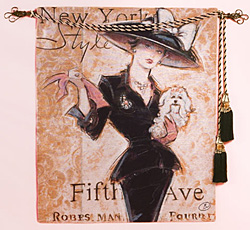Socialite Rank

I have come across the most entertaining US website: http://www.socialiterank.com
Socialite Rank is a sophisticated blog charting the highs and lows of the competitive New York social circuit. Nobody knows who is behind the site, which has led to much speculation across the pond. One featured socialite has reportedly even hired a private investigator to unveil the person(s) responsible, without success.
The busy socialites are rigorously assessed and ranked each month on the basis of the following stringent criteria:
1. Personal styles and designer relations (1-20 pts)
2. Press coverage in major publications and gossip columns (10 pts)
3. Appearances and commitment to events (10pts)
4. Hot factor- what makes each of the individuals sizzle with personality (10 pts)
What strikes me the most having read the articles (and especially the public comments which follow them) is how utterly obsessed the US appears to be with class. Discussions about what shoes one socialite wore to a fundraiser quickly turn into heated and venomous debates about whether their "breeding" befits their wealth and who their great great grandfather was.
My initial reaction to Socialite Rank was that the US were far more obsessed with class than the British. Otherwise, why would they be making such a fuss about it? In this country, for my generation at least, there is very little talk about class. But then it occurred to me that maybe that is because an awareness of class is so ingrained in us that we do not even need to discuss it; we just know it. You either have a title or you don't and that was probably settled hundreds of years ago. End of story. It reminds me of that sketch with John Cleese, Ronnie Barker and Ronnie Corbett. We know our place. However, most of us also know that it doesn't matter. Success and class do not go hand in hand.
In the US the upper class is new and competition for the mantle of "aristocracy" is hot. The criteria are very much based on the notion of "old money" which, of course, compared to British old money, is new money. Without the aid of hereditary titles, 21st Century Americans are left to work (or fight) it out for themselves: hence sites like Socialite Rank. Much of US Class is based upon entrepreneurial wealth and there are a lot of wealthy entrepreneurs in the US. The problem, which Socialite Rank highlights so beautifully, is whether the descendants of an entrepreneur 100 years ago are to be considered more highly-bred than the children of an entrepreneur of the 1980s. The existing class system in the UK, of course, has had hundreds of years to mature, or fester, and so has much less to do with wealth. In 21st Century Britain you can be Richard Branson's daughter, but that will not make you an aristocrat. In the US being heir to an oil fortune or hotel chain might just get you in the door.
In the UK you get the odd aristo seeking a bit of celebrity every now and then (think Lady Victoria Hervey) and of course you get the odd celeb with delusions of aristocratic grandeur (think Victoria Beckham)- Their lives may be equally privileged, but each one knows on which side their bread is buttered, and so do we. In the US they would both be battling it out for the Socialite Rank Silver Spoon Award.
Ultimately, of course, your class doesn't make any difference if you are successful (take the Victorias above). As Imelda Marcos once said “‘Nouveau riche’ is better than ‘no riche’”.

0 Comments:
Post a Comment
Subscribe to Post Comments [Atom]
<< Home